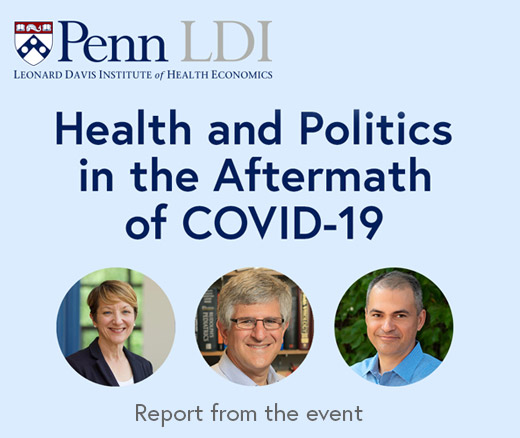
LDI Research Helped Shape Pennsylvania’s New Working Pennsylvanians Tax Credit
Pa.’s New Bipartisan Tax Credit is Designed to be Simple and Refundable – Reflecting Core Points From Penn LDI Researchers Who Briefed State Leaders
Population Health
In Their Own Words

Managing chronic conditions is inherently challenging, and these difficulties are compounded for low-income individuals insured through Medicaid, who face many barriers to good health.
A study published in JAMA Health Forum by our team, which included LDI Senior Fellows Lauren A. Eberly, Ashwin S. Nathan, Eric T. Roberts, Vincent J. Reina, Peter W. Groeneveld, and Sameed Ahmed M. Khatana, suggests that high housing costs could worsen the health of low-income non-elderly patients with heart failure.
In one of the first analyses to examine housing affordability and individuals’ health outcomes nationwide, we found that steeper housing costs were linked to higher rates of emergency department visits and hospitalizations for serious heart concerns.
Tools such as rental assistance and eviction prevention may be effective ways to lower hospitalizations and improve heart failure outcomes, the results suggest.
Data from the 2019 five-year American Community Survey allowed us to identify ZIP codes where low-income households (income less than $35,000) were spending 30% or more of their income on housing, a typical threshold for identifying housing cost burden.
We used 2019 Medicaid claims data from Medicaid beneficiaries with heart failure aged 19 through 64 to analyze hospitalizations and emergency department visits.
Among the 230,000 individuals in our sample, 18.4% had at least one cardiovascular hospitalization, and 32.3% had at least one cardiovascular emergency department visit in 2019.
When we examined the association with housing costs, we found that a 10-percentage-point rise in housing cost burden was associated with higher odds of cardiovascular hospitalization or emergency department visits, heart failure–specific hospitalizations, and all-cause hospitalizations.
In a separate analysis of more than 20,000 people in our sample, we found that moving to an area with a 10-percentage-point higher housing cost burden was linked to a higher risk of cardiovascular hospitalizations and hospitalizations for any cause.
Since this study looked only at 2019 data, we cannot rule out the influence of other unmeasured factors.
In addition, because our analysis was based on geographic areas rather than individuals, we could not determine whether individual beneficiaries experienced housing cost burden; we could only determine the conditions of the area in which they lived.
Other challenges common in low-income communities may also affect cardiovascular health and may have influenced our findings.
Our findings suggest that Medicaid beneficiaries with heart failure who live in areas with high housing cost burden may be at greater risk of emergency department use and hospitalization for cardiovascular issues.
Millions of low-income households spend more than 30% of their income on housing, and as housing becomes increasingly unaffordable, these associations raise important questions for policymakers and health systems.
Future research should investigate whether strategies that reduce the housing cost burden and improve housing stability, such as rental assistance, eviction prevention, and expansions of affordable housing, can contribute to enhancing the health of lower-income individuals with chronic diseases.
The study, “Housing Cost Burden and Outcomes Among Medicaid Beneficiaries With Heart Failure,” was published January 2, 2026 in JAMA Health Forum by Joniqua N. Ceasar, Lin Yang, Lauren A. Eberly, Ashwin S. Nathan, Eric T. Roberts, Vincent J. Reina, Peter W. Groeneveld, and Sameed Ahmed M. Khatana.



Pa.’s New Bipartisan Tax Credit is Designed to be Simple and Refundable – Reflecting Core Points From Penn LDI Researchers Who Briefed State Leaders

Announcing Bold New Goals While Crippling the Infrastructure Needed to Achieve Them

Promising New Evidence and What’s Next

From 1990 to 2019, Black Life Expectancy Rose Most in Major Metros and the Northeast—but Gains Stalled or Reversed in Rural Areas and the Midwest, Especially for Younger Adults

A Penn LDI Seminar Focuses on Why They’re Important for the Future

Former Philadelphia Health Commissioner Warns That Gutting the CDC, Undermining Vaccines, and Politicizing Science Will Leave the U.S. Dangerously Unprepared for the Next Pandemic